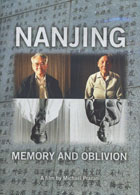
Nanjing Memory and Oblivion 2006
Distributed by Icarus Films, 32 Court St., 21st Floor, Brooklyn, NY 11201; 800-876-1710
Produced by Sophie Goupil and Sylvain Bursztejn
Directed by Michael Prazan
DVD, color, 53 min.
Sr. High - Adult
Asian Studies, History, World War II
Date Entered: 12/17/2009
Reviewed by Paul Moeller, University of Colorado at BoulderNanjing Memory and Oblivion investigates the controversy surrounding the atrocities committed by Japanese soldiers while occupying the Chinese capitol, Nanjing, in 1937. Hundreds of thousands of civilians were murdered and tens of thousands of women raped by Imperial Japanese Army troops during this episode. The actual figures, however, remain in dispute as historical revisionist and Japanese nationalist argue that the scale of the atrocities has been exaggerated by the Chinese for propaganda purposes. The Chinese, on the other hand, believe that the Japanese refuse to come to terms with their past actions and intentionally provoke Chinese by honoring dead Japanese soldiers through official visits to the Yasukuni Shrine.
In this documentary director Michael Prazan features interviews with surviving Japanese soldiers, Chinese victims, government officials, historians, and lawyers in describing the events that have come to be known as The Rape of Nanjing, and to explain how politicized it remains in Japan and China to this day. Prazan complements the interviews with archival photos and documents efforts by Chinese and Japanese to develop a shared understanding of the events. While Prazan glosses over the geopolitical events leading up to the massacre and does not investigate the motivations of modern Japanese and Chinese governments with any depth, he has produced a good introduction to the controversies surrounding the Nanjing Massacre. This film should serve well as a vehicle for classroom discussion. It is recommended for audiences from senior high school though adult with an interest in Asian history and politics and to those libraries who serve them.